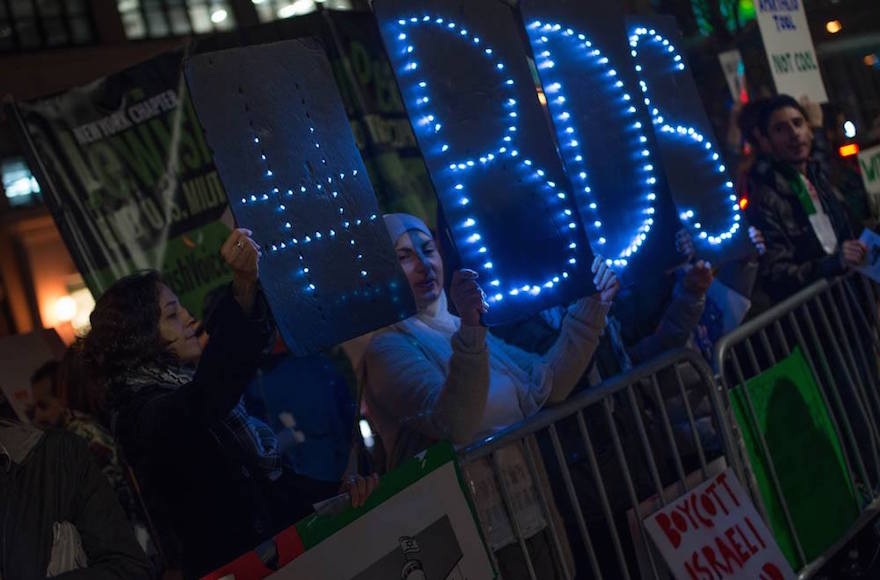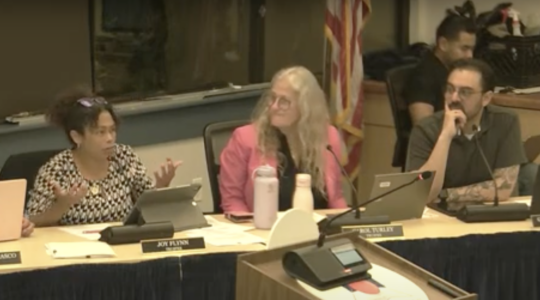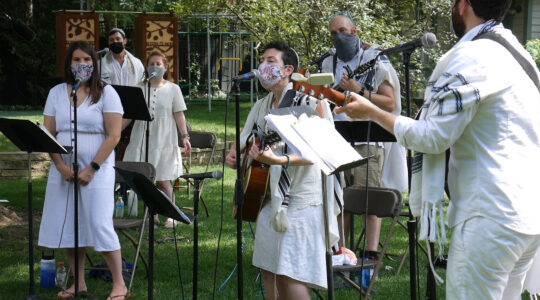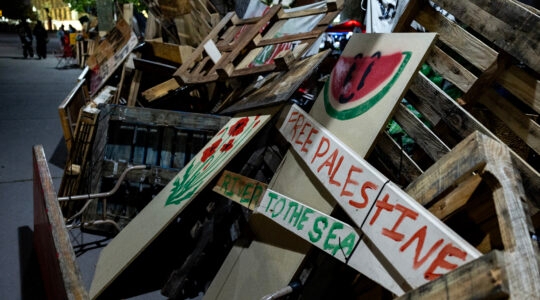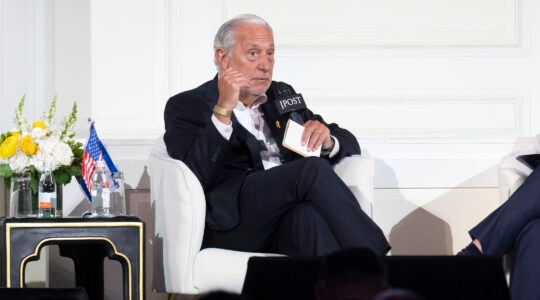WASHINGTON (JTA) – Nearly half the states in the country are considering legislation aimed at countering the Boycott, Divestment and Sanctions, or BDS, movement. But critics say some bills are cause for concern, either because they seek to legitimize Israeli settlements or go so far in punishing boycott supporters they infringe on constitutionally protected speech.
Two states, Illinois and South Carolina, passed laws last year mandating state divestment from companies that boycott Israel, according to a list maintained by Americans for Peace Now. Another 11 states – Arizona, California, Colorado, Florida, Georgia, Indiana, Iowa, Massachusetts, New Jersey, New York and Virginia – are considering similar laws. Kansas and Pennsylvania are debating legislation that would defund universities that participate in an Israel boycott. And another six states are considering or have adopted nonbinding resolutions condemning Israel boycotts.
In all, 21 state legislatures have taken up bills concerning BDS. Proponents say the trend will intensify this year, as activists move to consolidate their gains by pushing laws in states that have already passed nonbinding resolutions condemning BDS.
“Those states see what they’re doing now as a follow-up, as a successor,” said Eugene Kontorovich, a law professor at Northwestern University who has consulted with groups advancing anti-BDS legislation. “They’re implementing laws that use state contracting power to fight back against racism.”
Liberal activists see a different motivation, describing the push as a stealth maneuver to reverse nearly 50 years of U.S. policy of not recognizing the the legitimacy of Israeli settlements. Americans for Peace Now says 19 of the 54 BDS laws that have been proposed since 2014 extend penalties to those targeting only West Bank settlements. A bill adopted by the Indiana House of Representatives in January, for example, requires the state pension fund to divest from companies that participate in a boycott of businesses based in Israel “or territories controlled by the Jewish state of Israel.”
“Backers of this effort are cynically exploiting concerns about anti-Israel BDS to promote legislation that while purportedly about defending Israel, is actually about legitimizing settlements,” said Lara Friedman, Americans for Peace Now’s director of government relations. “Most American Jews and legislators don’t understand that their support for Israel is being abused to promote an agenda that is anathema to their long-held view.”
In some cases, traditional pro-Israel groups and lawmakers have driven the legislative push. Virginia’s legislation, backed by the Jewish Community Relations Council of Greater Washington, does not include language protecting the settlements. Ron Halber, the JCRC director, said that doing so would split a Jewish community still reeling from the contentious debate last year over the Iran nuclear deal.
READ: Canadian Parliament officially condemns BDS
“The greatest threat to Israel is the disunity of the American Jewish community,” Halber said. “Any legislation we do, we’re going to make sure both sides feel comfortable.”
Nationally, establishment pro-Israel groups including the American Israel Public Affairs Committee back congressional legislation that would extend anti-BDS protections to settlements, most recently a bipartisan bill that removes obstacles in federal law for states that want to divest from entities boycotting Israel.
New York’s bill, which was adopted by the state Senate in January and was ordered to have a third reading in the Assembly, does extend protections to Israeli settlements. The bill requires the state to produce a list of “persons” deemed to be engaging in a boycott who would then be rendered ineligible to do business with the state.
Jack Martins, the Republican state senator who initiated the bill, said that allies should defer to one another on security issues, noting that the Israeli government has cast efforts to single out settlements as a threat.
“As a sovereign nation they have the ability to make the decisions for themselves,” he said. “Any actions” boycotters “take against Israel or its components is an attack on our relationship with Israel.”
A spokeswoman for Jewish Voice for Peace, a group that backs the BDS movement and is among a network of groups countering the anti-boycott laws, said New York’s bill amounts to a “blacklist.”
“The tactic of economic pressure is becoming increasingly accepted and has prompted a backlash of questionable constitutionality,” spokeswoman Naomi Dann said.
The New York JCRC declined to say whether it supports the law, which is backed by the Zionist Organization of America and other right-wing groups. Simcha Felder, the Democratic state senator who co-sponsored the bill, said the law doesn’t limit anyone’s right to free expression.
“The legislation doesn’t prevent anyone from speaking or promoting a boycott, nor from making other vile and prejudicial statements,” Felder told JTA in an email. “That’s a person’s constitutional right. But they don’t have a constitutional right to be a New York State contractor.”
Several activists involved in BDS legislation said the failure of Congress to act on Israel boycotts has forced the issue at the state level, where public pension funds often invest in companies targeted by the BDS movement. Though there are a number of proposals under consideration in Washington, none are as sweeping as the Illinois and South Carolina laws.
“There’s been no movement,” said Ira Silverstein, a Democratic state senator in Illinois who sponsored the nation’s first state anti-BDS law, which banned pension funds from dealing with entities that boycott Israel. “Congress has its own issues.”
READ: Report: Anti-Israel campus activists shifting strategies, facing internal divisions
Two trade laws passed in Washington in the last year include provisions extending previous congressional calls to discourage cooperation with entities that boycott Israel to those that solely target settlement goods. The Obama administration has said it will comply broadly with the laws, but will ignore provisions that seek protection for settlement goods.
Right-wing Jewish activists have allied with Proclaiming Justice to the Nations, a pro-Israel Christian group that has been involved in advancing anti-BDS measures in several southern states. Joanne Bregman, a Jewish lawyer in Nashville, Tennessee, who has worked with Proclaiming Justice to the Nations on anti-BDS legislation, said she sees no difference between boycotting Israeli settlements and boycotting Israel proper.
“You either believe Judea and Samaria was always part of Israel or you do not,” Bregman said, using the biblical terms for the West Bank.
Elliot Bartky, a political science professor at Indiana University-Purdue University, Fort Wayne, and his group, the Jewish American Affairs Committee of Indiana, moved the legislation through the Indiana House.
In 2011, Bartky co-wrote an Op-Ed in the American Thinker that laid out a plan to challenge the “leftist” Jewish establishment. Bregman, who befriended Bartky after reading the Op-Ed, told JTA it was “startling” to encounter official Jewish reluctance to partner with Christian groups in advancing BDS legislation.
The Indianapolis JCRC in an email said it supports the Indiana law and acknowledged Bartky’s leadership in getting it passed.
“The JCRC has directed the lion’s share of our anti-BDS efforts toward educating the larger community outside the statehouse, particularly on central Indiana campuses where there has been a precipitous uptick in pro-BDS events,” said Lindsey Mintz, the JCRC director.
CORRECTION: An earlier version of this story erroneously stated that Proclaiming Justice to the Nations and Joanne Bregman were responsible for pushing anti-BDS legislation through the Indiana House of Representatives.
JTA has documented Jewish history in real-time for over a century. Keep our journalism strong by joining us in supporting independent, award-winning reporting.
